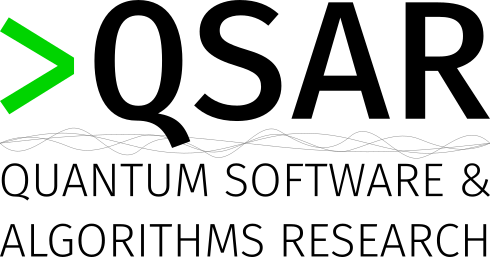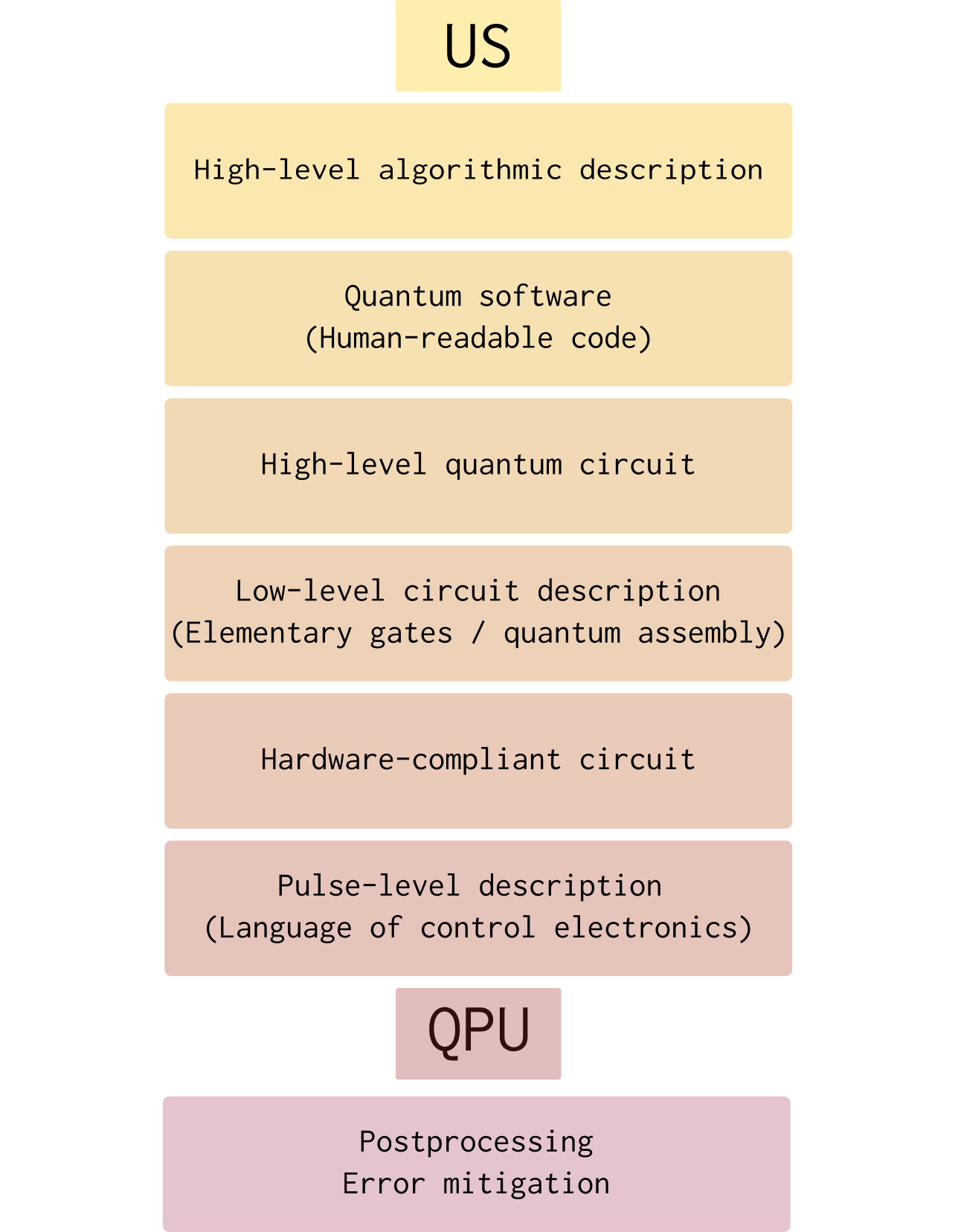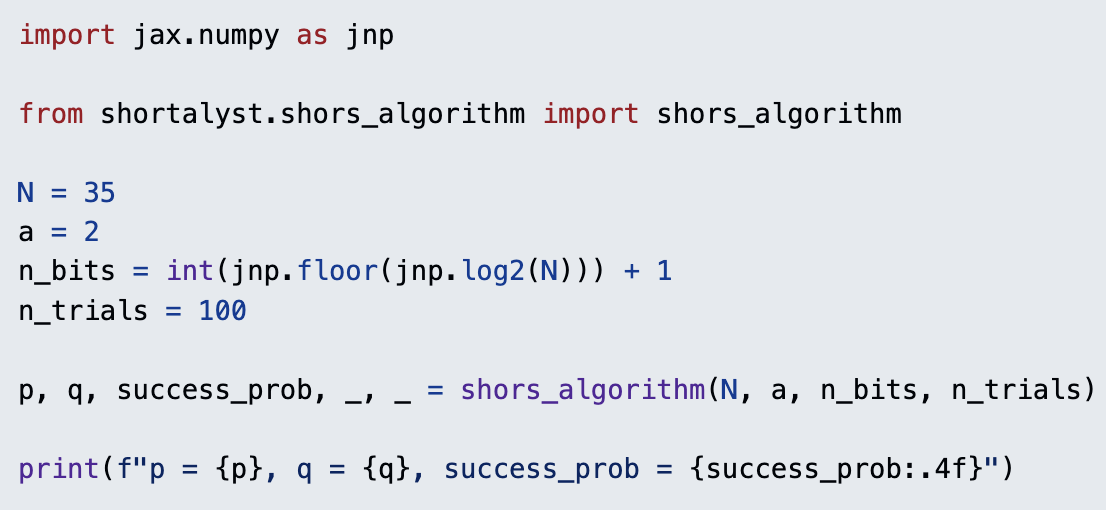Quantum software and algorithms research
About
The QSAR group works on designing and implementing the software that
enables us to write and run algorithms on quantum computers. It was
established in 2022 in the Department of Electrical and Computer
Engineering at UBC in Vancouver, Canada, and is a part
of Quantum BC.

News
- (2026-01-05) Welcome to Sam and Chirag! Sam will
be working on a masters project about compiling quantum simulations of lattice
gauge theories. Chirag will be adding new features to our
quantum debugger, CircInspect, for his co-op work terms.
- (2025-10-22) Congratulations to Jacky on a successful
MASc thesis defense and PRD publication! All the best for your PhD at
The University of Sydney.
- (2025-09-12) Congratulations, Gideon, on completing your
PhD and for earning a research internship at PsiQuantum!
- (2025-09-01) Kilian Poirier joins the QSAR Lab as
a new PhD student. Welcome!
- (2025-08-22) Huge congratulations to Gabe
on a successful
MASc thesis defense! Best wishes for your PhD at
University of Calgary.
- (2025-05-14) Welcome, Parvin Aliyeva! Parvin, a UBC computer science and physics undergraduate student, will work with the lab this summer as part of the WLIURA program.
- (2025-05-05) Congratulations to Ritu, who will be
spending the summer with Xanadu as part of
their Residency Program's 2025 cohort!
Past news items can be found in our
news archive.
Research
Software and compilation
Quantum compilation is the process of translating a high-level
description of a quantum algorithm into a set of instructions that
is executed on hardware. It's a process with many moving parts
that typically involve solving computationally hard problems.
Our areas of investigation include:
- Automating quantum compilation pipelines
- Designing new quantum programming abstractions
- Methods and tools for testing and debugging quantum
programs
- Exploring how compilers can be scaled to support
fault-tolerant systems
Ultimately, we are interested in doing the "hard part" (such as
the optimization process in the gif below), so quantum computing users
can focus on the problems they want to solve, rather than
low-level compiler details.

Quantum algorithms and applications
Compared to classical computing, there are relatively few known
quantum algorithms, and even fewer that will one day achieve the
substantial speedups needed to solve life-sized problems.
Our
group works on both co-designing and implementing software that
facilitates our reasoning about algorithms, and exploring how it can be used
to develop new algorithms and applications.
Our ongoing projects include:
- Exploring the use of higher-dimensional qudit systems for quantum algorithms
- Applying quantum computing to
problems in nuclear, particle, and condensed-matter
physics
- Resource estimation and optimization of quantum algorithms for practical
applications at scale
Recent Research Contributions
N. Quetschlich, ODM (2025) An experience-based classification of quantum bugs in
quantum software. Computing 107, 193.
(arXiv)
J. Jiang, N. Klco, ODM (2025) Non-Abelian dynamics on a cube: improving quantum
compilation through qudit-based simulations. Phys. Rev. D 112, 074512.
(arXiv)
D. Ittah, J. Fraser, J. Izaac, ODM (2025) Constant-time hybrid compilation of Shor's algorithm
with quantum just-in-time compilation arXiv preprint.
M. Khan, P. Nair, ODM
(2024) CircInspect: Integrating Visual
Circuit Analysis, Abstraction, and Real-Time Development in Quantum
Debugging. In Proc. of 2024 IEEE International Conference on Quantum Computing
and Engineering (QCE), Montreal, PQ. pp. 1000-1006.
G. Uchehara, T. Aamodt, ODM
(2024) Graph-based identification of qubit network (GidNET) for qubit reuse. In Proc. of 2024 IEEE International Conference on Quantum
Computing and Engineering (QCE), Montreal, PQ. pp. 1120-1131.
(arXiv)
ODM (2024)
On the need for effective tools for debugging quantum programs. In
Proc. of the 5th ACM/IEEE International Workshop on Quantum Software
Engineering (Q-SE 2024). Association for Computing Machinery, New York, NY,
USA, 17–20.
(arXiv)
(Older research contributions can be found in our
research archive).
Software Contributions
Our group's full software suite can be found on our GitHub organization page.
People
Current members
- Abhishek Abhishek (PhD student)
- Parvin Aliyeva (undergraduate student)
- Nishanth Baskaran (PhD student)
- Sam Eisenbach (MSc student)
- Mushahid Khan (co-supervised PhD student)
- Kilian Poirier (PhD student)
- Chirag Raisingh (undergraduate student)
- Ritu Thombre (PhD student)
Former members
- Cihan Bosnali (undergraduate student, summer 2024 - winter 2025)
- Gabe Bottrill (MASc student, 2023-2025)
- Jackson Fraser (undergraduate student, winter 2025)
- Jacky Jiang (MASc student, 2023-2025)
- Tanishq Pradhan (undergraduate student, summer/fall 2024)
- Nils Quetschlich (visiting PhD student, summer 2024)
- Gideon Uchehara (co-supervised PhD student, 2020-2025)
Positions
For prospective graduate students
Prospective MASc students
I am not seeking MASc students at this time, and will not respond to inquiries.
Prospective PhD students
The UBC ECE deadline for a September 2026 program start has passed. Please
check back in the future for information about future opportunities.
For UBC undergraduate students
There are currently no available undergraduate positions. Summer
2026 positions have been filled.
Group code of conduct
All QSAR group members are expected to uphold the following codes of
professional and scientific conduct. The text below is partially
based on CoCs of the
Tropini,
Avasthi, and
Willis labs.
The CoC was last reviewed in September 2025. As a group, we will
review and update it together on at least a yearly basis (in
particular, following an influx of new members) so that everyone has
the opportunity to contribute their ideas.
Professional conduct
- You work with the group, not for the group.
All group members, regardless of academic status, are independent
researchers in training. Everyone comes with their own skill set and
experience, and contributes their unique perspective to the work
that we do. We work together and don't compete with each other.
- Be professional with everyone. Treat other group members
and your shared space with respect. Ensure everyone has the chance
to speak during group meetings, and be mindful of interrupting or
talking over others. Our work hours are flexible, so be considerate
of the time and schedules of your colleagues. When you are
collaborating with others, giving a talk, or at a conference, you
are out representing our group. Conduct yourself in the same
professional manner as you would within the group, regardless of
where you are and who you are with, and follow the CoCs in place at events.
- Harassment will not be tolerated. There is zero
tolerance for exclusionary comments or jokes, threats, or
violent behaviour or language. Offensive behaviour or comments of
any kind relating to gender, gender identity and expression, sexual
orientation, disability, mental illness, neuro(a)typicality,
physical appearance, body size, age, race, ethnicity, religion,
lifestyle choices, etc. are not welcome in our group. Please do not take
photographs of others, share their work, or post
personally-identifying information online without their explicit
permission.
- Ask for help when needed, and provide it willingly.
Everyone is here to learn, so ask lots of questions! When you
receive questions, respond to them respectfully without putting the
other person down; focus on helping the other person learn how to do
something, rather than simply doing it for them. Be mindful of
people's time: if your question is something a quick online search
will resolve, do so before reaching out.
- Provide constructive feedback. Feedback is meant to help
someone improve. Identify errors when they occur, and make direct
and honest suggestions where appropriate (including to the group
lead!). Make feedback about the work, not the person. This includes
discussions about the work of others.
Scientific conduct
- We share our data and code. We post preprints on
arXiv so our work is available to everyone. We publish our source
code and data under permissive licenses on GitHub or other
code-sharing platforms. We also prioritize the use of open-source
libraries and contribute back to them when we can.
- We conduct our work with integrity. Never falsify,
make omissions, or otherwise manipulate your code or data. Our work
should be reproducible by others in the field, and we should provide
everything needed to enable that.
- We collaborate. This includes with other research groups
at UBC and beyond, companies, and online communities. We treat
confidential information within collaborations with the utmost care. If
you wish to collaborate with an external party, great!
Please initiate a discussion with the group lead first.
- We provide proper attribution. Always cite sources and
images in written work and presentations, even if the source is
yourself. When using external software libraries, make sure
to check the licenses.
- We are mindful about the use of generative AI. It is
useful for code completion and boilerplate code once you're
comfortable implementing something from scratch. It's also helpful
for learning about a new topic, checking your understanding, and
rephrasing or checking grammar on a first draft written based on
your own ideas. However, please don't provide models not trained and
hosted by us (or a partner we trust) with large blocks of text or
code from unpublished work, or use them for projects containing
confidential information or IP.
- It's okay to make mistakes. Everyone makes them, this is
how we learn. It is important to be open and honest about them,
accept responsibility, and we will work together to resolve
them.




